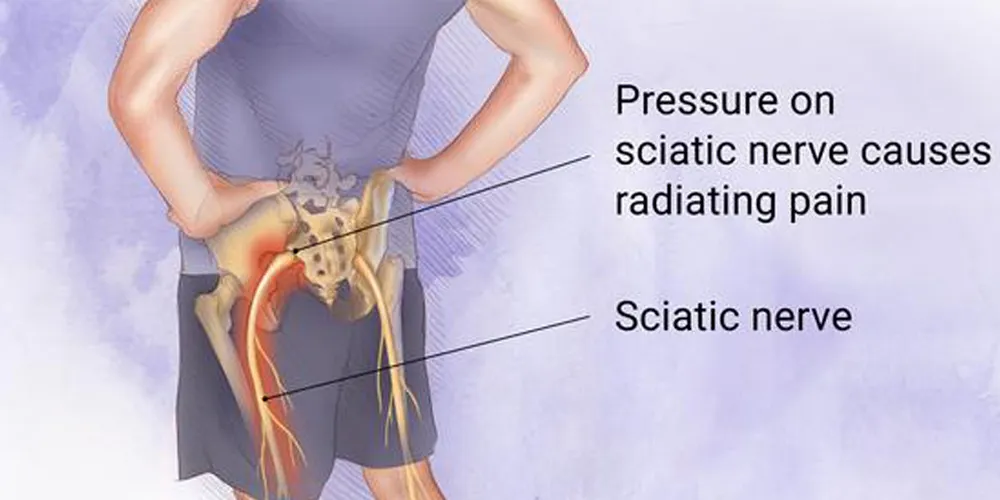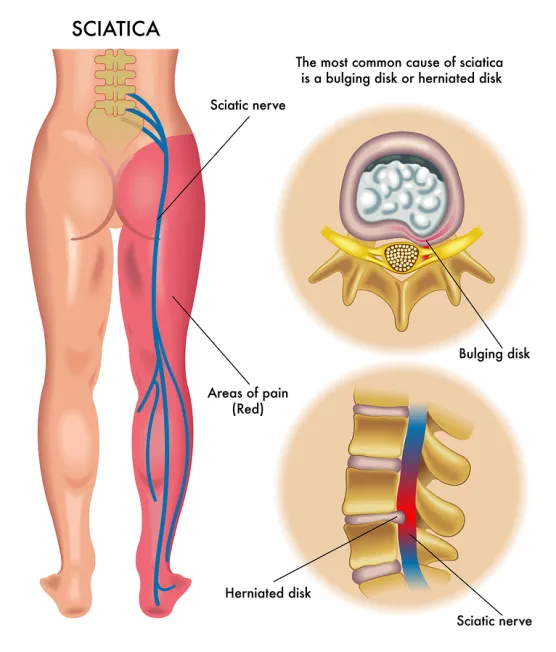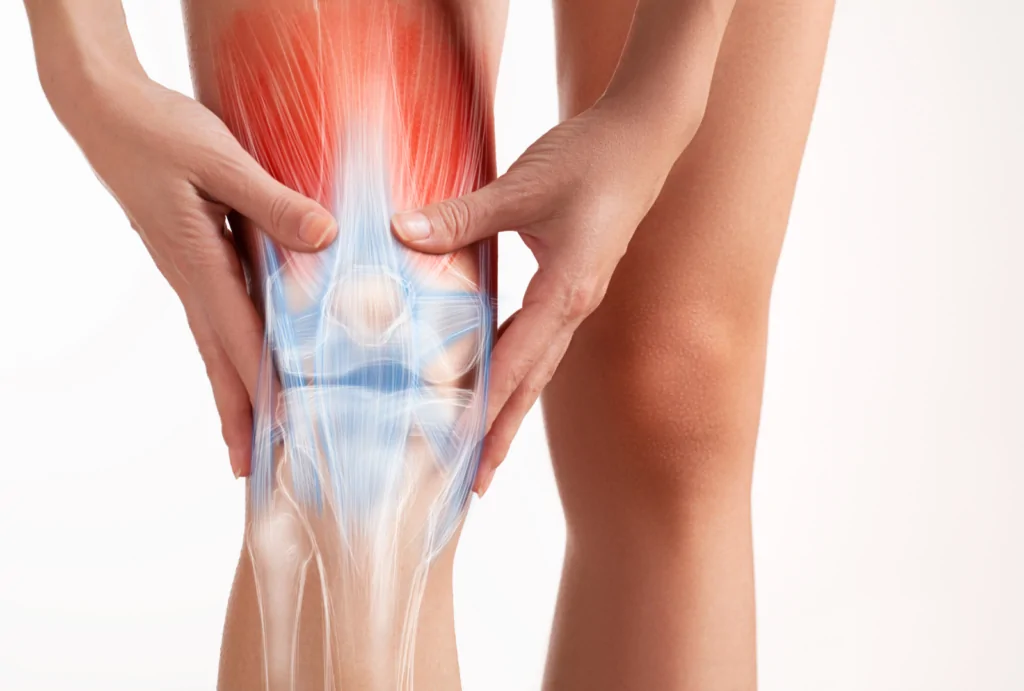Can Sciatica Cause Knee Pain? If you’ve experienced pain in the sciatica you may be familiar with the terrible pain that travels down your leg. However, did you realize that your knee pain may originate from sciatica? The association between sciatica & pain in the knees will be analyzed in this article, along with the symptoms, causes, diagnosis, and potential treatments.

Understanding Can Sciatica Cause Knee Pain?
Pain that travels along the sciatic nerve, which originates from your lower back and passes down the hips, buttocks, and legs, is called sciatica. A slipped and herniated spine disk that pushes on the roots of the nerves is a frequent cause of sciatica.
What are the Symptoms Can Sciatica Cause Knee Pain
Common neuropathy symptoms include:
- Sharp, shooting agony up a single leg, along the buttocks, through one’s lower back
- A tingly or numb feeling in your foot and thigh
- weakening of muscles in the afflicted leg
How Does Sciatica Cause Knee Pain?
Since sciatica compresses or irritates the nerve that runs down the back, it may trigger knee pain. In the legs, this nerve is in charge of feeling and controlling muscles. Pain that radiates from the lower back through the knee and perhaps even to the foot may result from compression.
What is The Relationship Between Sciatica and Knee Pain
Compression of Nerves and Spread of Pain
The muscles and tissues of the leg, especially those surrounding the knee joint, are innervated by the sciatic nerve. Knee pain may be the consequence of painful signals being sent to the knee area due to compression or inflammation of the nerve.
Pain Patterns That Radiate
Sciatica sensation often follows a pattern, originating in the lower back or buttock and extending down the back of the thigh, calf, and occasionally to the knee. This pain that radiates may be electric, searing, or acute.

Diagnosing Sciatica Can Sciatica Cause Knee Pain
To identify knee discomfort associated with sciatica, medical professionals will usually perform:
- An extensive evaluation of medical history
- Physical assessment with an emphasis on neurological symptoms
- Imaging studies to see the spinal and spinal cord, such as CT, MRI, or X-rays
What are the Treatment Options Can Sciatica Cause Knee Pain
The degree of sensations and the root cause determine the duration of therapy for sciatica-related knee pain:
Prudent Administration
Medication: Painkillers, muscle relaxants, or nonsteroidal anti-inflammatory medications (NSAIDs).
Physical therapy: Exercises aimed at improving mobility & strength in the core.
Chiropractic Care: Spinal adjustments and manipulations.
Interventional Techniques
Anti-inflammatory: Drugs are administered near the injured nerve root by epidural steroid injections.
Nerve Blocks: These temporarily stop certain nerve cells stopped transmitting pain signals.
Procedure
In severe cases of sciatica that do not improve with conservative measures, surgery could be advised. To release compression on the nerve, discectomy or laminectomy, or are common treatments.

Some Home Remedies and Self-Care
Apart from seeking medical attention, people can take care of sciatica-related knee discomfort at home by:
Techniques for managing pain: Physical treatment, hot or cold compresses.
Stretching and exercise: Pilates, yoga, or low-impact aerobics.
Posture correction: Ergonomic changes made to avoid making symptoms worse.
Some Of the Sciatica pain relief Entity are:
- Ortho Ayurvedic Pain Relief Oil
- AGEasy Comfort Knee Cap For Men And Women
- Orthopaedic Knee Support Leg Rest Pillow
- Back Support Systems Knee-T Leg Pillow
What are the Preventive Measures
Avoiding pain in the knee related to sciatica entails:
Lifestyle Adjustments: Keeping a healthy weight and using the right lifting form.
Ergonomic considerations: To lessen back strain, use equipment and supporting furniture.
When to Seek Medical Help for Can Sciatica Cause Knee Pain
Seeking medical assistance is crucial if knee pain associated with sciatica is accompanied by:
- an absence of bladder or bowel control.
- extreme weakness or numbness.
- progressive signs that get worse with time.
Complications of Untreated Sciatica
Ignoring sciatica can result in a reduced standard of life, persistent pain, & permanent damage to the nerves. Prompt action is essential to avoid long-term issues.
Some Alternative Therapies
Some complementary therapies may be used in conjunction with traditional treatments, such as:
Acupuncture: Applying pressure to certain spots to reduce pain.
Pilates and yoga: Increasing the ability of the muscles to support the spine.
Healing and Rehabilitative Care
The goal of rehabilitation programs is to regain functionality and flexibility by:
- Sessions of physical treatment aimed at certain muscle areas.
- Gradual return to regular activities while being supervised by a professional.
Living with Chronic Sciatica
Among the coping mechanisms used by people with persistent sciatica are:
- Methods for managing stress, such as awareness or meditation.
- consulting medical experts and community groups for assistance.
Conclusion
In conclusion, because sciatica can compress or irritate the nerve that runs down the leg, it can induce knee discomfort. Comprehending the correlation between these two ailments is vital for accurate diagnosis and efficient management. A holistic strategy that integrates medical interventions with self-care techniques can help people manage symptoms and enhance their quality of life.
Frequently Asked Questions
What are the main causes of sciatica-related knee pain?
The primary reason is sciatic nerve irritation or discomfort, which is frequently brought on by spinal canal narrowing or a herniated disc.
Can knee pain be the only symptom of sciatica?
Sciatica may trigger knee pain, but it generally comes with accompanying symptoms like numbness, leg pain, or back pain.
Can sciatica knee pain lead to permanent disability?
Recurrent sciatica can cause limitation in extreme circumstances. Appropriate therapy and early intervention can reduce this risk.
